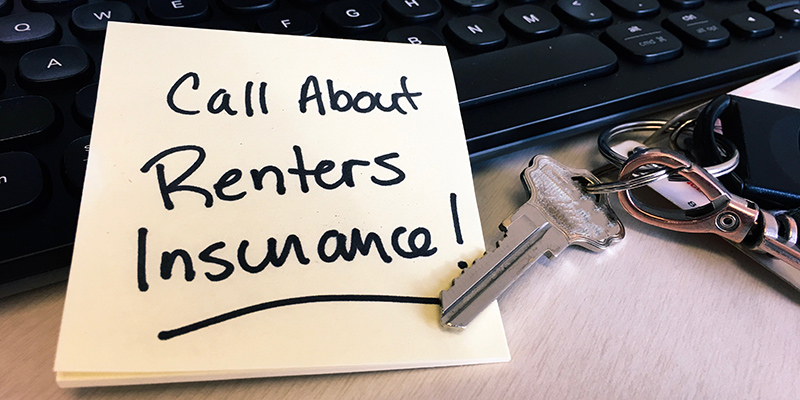It is essential for tenants to obtain renters insurance to protect their belongings. But more often than not, renters fail to do so because they feel it is a waste of money. This is a common and dangerous misconception.
In this article:
What Is Renters Insurance?
Renters insurance is a type of property insurance that protects the personal belongings of the insured as well as against liability claims. It is offered to renters of various properties such as a house, townhome, apartment, condo, loft, studio, mobile home, and the like. Many also refer to it as tenant insurance.
Many tenants mistakenly believe that their landlord’s insurance will cover their own personal loss. As such, when something happens — like a fire or a break-in — they are surprised to find that their landlord’s policy can’t compensate them. This leaves the renter to suffer the damages alone.
With renters insurance, you can be sure of protection when such instances occur. Apart from protecting your personal belongings within the rental property, renters insurance also protects you from losses arising from claims of liability. For example, if someone gets injured on the property, renters insurance will apply if the injury was not the result of a structural problem.
Tenant insurance can come in many forms, though your average policy generally has two types of coverage options: Actual Cash Value coverage and Replacement Cost coverage.
- Actual Cash Value: With this type of coverage, your insurance provider will reimburse you for the value of the items at the time of loss or damage.
- Replacement Cost: With this type of coverage, your insurance provider will shoulder the cost of replacing the lost or damaged items.
What Does Renters Insurance Cover?
Tenant insurance consists of three coverage parts — personal possessions, liability, and additional living expenses. Let’s break each one down below:
Personal Possessions
This portion of renters insurance coverage insures the personal items in your rented home. Basically, if you lose your belongings as a result of a covered peril, your policy will shield you from total or partial financial loss. Covered perils typically include the following:
- Fire
- Hail

- Lightning
- Windstorm
- Volcanoes
- Theft
- Vandalism
- Riots
- Explosions
- Plumbing and electrical breakdowns
- Damages caused by vehicles
Most policies, though, do not cover floods and earthquakes. If you require coverage for these perils, you will need to purchase a separate policy.
Liability
The liability portion of the insurance offers protection in case you find yourself on the receiving end of a lawsuit after someone gets injured in your rented home. It also comes into play if you, your family member, or your pet causes harm or damage to other people.
Your insurance will pay for legal expenses and court judgments (damages). Liability coverage, though, only covers up to a specified amount. It typically starts at $100,000 and can go as high as $300,000. That is usually the limit; anything above that will require you to purchase an umbrella policy.
Additional Living Expenses (ALE)
In the event that your rented home becomes uninhabitable because of a covered peril, your insurance will cover the cost of temporary accommodations. This includes the cost of the hotel room, any restaurant meals, and other expenses while you wait for the restoration of your rented home. But, there is normally a dollar limit or a time limit for this.
What Renters Insurance Does Not Cover
For most basic tenant insurance policies, certain “acts of God” and situations are not automatically included in the coverage. These things will require you to purchase either a separate policy or an additional premium. Of course, it must go without saying that any damages or loss you caused yourself are out of the question, too.
Additionally, if you have valuable items that command a high price tag, basic plans may not cover these as well. Common examples of such items include fine jewelry, art and antiques, and high-end electronics. In this case, if you want such items to be covered, you will typically need to buy floater insurance.
How Much Does Renters Insurance Cost?
One thing that prevents most tenants from obtaining insurance is the price tag. After all, you are already paying hundreds in rent, so why add another expense every month?
But, contrary to what you may believe, tenant insurance is actually quite affordable. How much is renters insurance? On average, renters insurance will cost you about $15 per month. This is definitely cheaper compared to homeowners insurance, which averages around $100 per month.
Of course, that is not to say that this price universally applies to all plans. The monthly premium for tenant insurance can still vary depending on where you are and the company you purchase it from. Additionally, the coverage amount and deductible you select can also influence the cost of your policy.
If you are looking for cheap renters insurance, though, it helps to shop around. Ask companies to provide you with their renters insurance quotes before making a decision.
How to Get Renters Insurance
Once you decide to purchase tenant insurance, don’t just jump at the first offer you receive. To get the best renters insurance for you, it is important to follow the steps below.
1. Evaluate Your Needs
The first thing you must do is evaluate your needs. List down everything you own and take photos of each one. Don’t forget to include any serial numbers attached to the item, especially for the more expensive ones. If you can manage it, it is also a good idea to include an estimated value for each item. This will help you avoid under-insurance and support any claims you file to the company.
2. Shop Around
Once again, it is imperative that you consider all of your options before settling on an insurance company. Since filling out an application normally does not cost anything, there is no harm in doing that for all the companies you are considering. This way, you can get a more detailed picture of what each company has to offer you. It will help you make an informed decision and choose the one that best suits your needs.
3. Customize Your Policy
 After settling on a provider, it is time to tweak your plan. You will have to choose between replacement cost or actual cash value coverage. It is best to go with replacement cost coverage.
After settling on a provider, it is time to tweak your plan. You will have to choose between replacement cost or actual cash value coverage. It is best to go with replacement cost coverage.
This option insures your belongings for the cost of replacing them instead of the value of the items when you lost or damaged them. For example, if someone steals your TV, your policy will allow you to buy a new one at full cost as opposed to simply reimbursing you for its depreciated value.
Keep in mind, though, that replacement cost coverage typically costs more than actual cash value coverage. For this reason, you should only go with replacement cost coverage if your budget permits it.
The Best Decision You Can Make
Clearly, renters insurance is necessary not only because most landlords require them but also because it offers many benefits to tenants. If you want to protect your personal belongings and shield yourself from liability, buying tenant insurance is the way to go. It is one of the wisest financial decisions you can make as a renter.
Landlords often have trouble finding tenants, collecting rent, and generally managing their rental property. This is where professional property management comes in. Start looking for a property management company today with the help of our online directory.
RELATED ARTICLES:
- Rental Scams: Top 9 Signs And How To Avoid Them
- Is Landlord Responsible For Fallen Tree?
- Can Renters Paint Rental Units? Should Landlords Do The Repainting?




 Company
Company